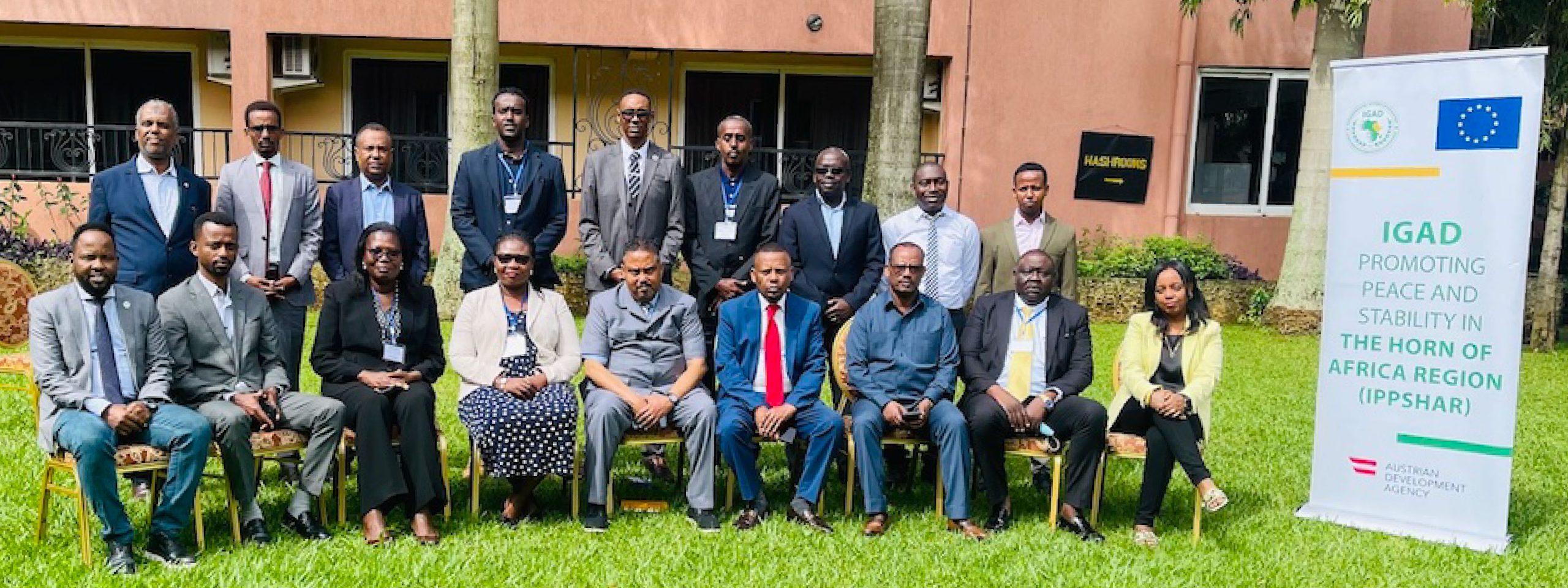April 28, 2023 (ENTEBBE, Uganda): IGAD Security Sector Program (IGAD SSP) conducted a three-day regional forum for Networks of Judges, Prosecutors, and Crime Investigators to enhance Criminal Information Sharing against Transnational Security Threats held on 26-28 April 2023 in Entebbe, Uganda. The overall objective of the forum was to forge a formal network for effective criminal information sharing as part of regional cooperation and coordination among the Police, the Criminal Justice Sector, and the Judiciary.
The criminal information system is a system for the storage, analysis, and retrieval of criminal records. The principal function of the system is to support law enforcement and criminal justice activities, allowing criminal justice agencies to enter, search, and use information about various crimes. Countries have their national systems, although varies according to their capacity, capability, need, the type of crimes, the agencies involved, and so on. IGAD Member States are no exception. Each Member States have put in place systems according to their needs and capabilities. IGAD SSP, as a regional organization, has supported the Member States in their efforts to put in place various mechanisms in countering and preventing the security threats affecting them at national and regional levels. In this regard, it is recalling the validated comprehensive review of the national Criminal Information Systems of all Member States conducted in the year 2019. The objective of the review was to assess and review the national criminal information system by identifying the gaps and limitations to enable establishing of a regional harmonized standard criminal information system. The review described in detail the existing technical capabilities, and the regulatory agencies, identified strengths and limitations of the respective systems and cooperation mechanisms with other agencies and provided recommendations. Further to this, various efforts meant to facilitate and enhance information sharing among practitioners dealing with transnational security threats within law enforcement agencies, the criminal justice sector, and the judiciary have been carried out. In this aspect, creating a formal network among the three institutions/agencies of the Member States, namely the public prosecution, the judiciary, and the criminal investigation unit of Police, is necessary to enhance criminal information sharing at the regional level.
The forum was officially opened by Commander Abebe Muluneh, the Director of IGAD SSP, on behalf of the IGAD Executive Secretary, H.E. Dr. Workneh Gebeyehu. In his welcoming remark, he stated that “Criminal Intelligence has become a central tool in modern crime control that is used by law-enforcement to understand rapid changes in crime and criminality. Sharing information to improve criminal intelligence serves, first and foremost, to increase the knowledge available for decision-making. This can help not only to identify which criminal groups to target but also, in an age of resource constraints, to triage out lower-risk cases. It can also help to prevent “linkage blindness,” where the information available in one jurisdiction is not available in other jurisdictions.” He further emphasized that “Success in addressing transnational security threats hinges on multilateral cooperation. However, existing cooperation regimes are ineffective at countering the rapid changes in the transnational security threats landscape, and countries increasingly tend to turn to national solutions. The diminishing support for multilateral cooperation means the international criminal justice system has become disjointed, insufficient, and reactive”. He concluded by highlighting the work IGAD SSP is doing by saying, “We are working to have regional cooperation and collaboration mechanism that focus on (1) Criminal information and intelligence sharing, (2) Research, analysis, and training, (3) Operational support and capacity building, (4) Harmonization of national security frameworks, (5) Liaison functions, and (6) Public awareness”. .
Twenty (20) representatives from the Public Prosecution, Judiciary, and Criminal Investigation of all Member States attended the forum. The forum was facilitated by practitioners and experts from Uganda who have shared experiences among and between the delegates. During the three days, the following themes were thoroughly discussed:
- Criminal information system and mechanism – concepts, definitions, criminal records databases, early warning criminal intelligence reports, etc.
- Transnational Security threats and their implication –definitions of crimes, the vulnerability of the threats, classification, and structures of crimes, etc
- Intelligence and criminal information: gathering, investigation, evidence, prosecution, etc
- Legal frameworks for criminal information and intelligence sharing – criminal justice law/policy, national and international laws, etc
- Multiagency approach to tackle various security threats
- Roles and Cooperation between law enforcement and the Criminal justice sector
- Mutual legal assistance and extradition
- Risk analysis in relation to serious and organized transnational crime
- Early warning criminal information/intelligence reports and their dissemination
- Challenges and opportunities for information sharing
At the end of the forum, delegates came up with recommendations and developed a Terms of Reference (ToR) for the Network.
The regional workshop was generously funded by the European Union Trust Fund EUTF) and implemented by IGAD SSP and the Austrian Development Agency (ADA) under the agreement to implement the project titled “IGAD Promoting Peace and Stability in the Horn of Africa Region (IPPSHAR).”
